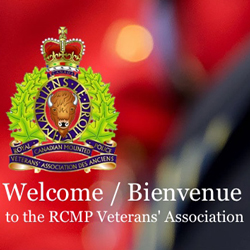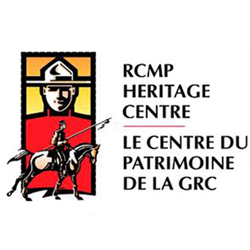A Memory Of World War Days – Yarns Of The Old Force

Veteran Windy Gale transcribed and sent to us this article which first appeared in the 1933 edition of the Vancouver Division’s Scarlet & Gold Magazine.
RCMP Veteran Corporal Robert Gordon Mathews submitted the following information to the editor of the Scarlet & Gold Magazine:
OLD ACQUAINTANCES RENEWED BY MEMBERS OF THE NORTH WEST MOUNTED POLICE – MAY FAMOUS MEN OF THE FORCE SAW SERVICE IN THE LATE WAR – “OLD SOLDIERS NEVER DIE”

Photograph of the 13th Canadian Mounted Rifle cap badge.
When the 13th C. M. R. went forth to war in 1916 and in due course arrived in Liverpool, it was booked right through to Shorncliffe, one of the most important military camps in England. Some 60,000 troops were in training there at that time, every mother’s son of them a Canadian. The 13th was a Southern Alberta concern recruited from Claresholm, Pincher Creek, Macleod, Lethbridge, Cardston and the Crows Nest Pass. It was supposed to be a mounted regiment and consequently attracted many a young chap who had had more or less of a ranching experience, and also not a few ex-Mounted Policemen.

Photograph of members of the 13th Canadian Mounted Rifle during World War I (Source of photo – Alberta Provincial Archives).
The fact that the regiment never saw the hair, let alone the hide, of a horse and that before many months it was transformed into an infantry battalion, which put an abrupt termination to its visions of executing cavalry manoeuvres en route to Berlin, and it made its bow at Shorncliffe as the 13th C. M. R. Infantry Battalion. Its career under that title was very brief, for in about 48 hours it had been scattered to the four winds of Heaven; that is to say, it was “broken up” and half of its personnel went into the Princess Pats and the other half was transferred to the Canadian Reserve Cavalry Brigade. The Brigade occupied Somerset Barracks and consisted of the reserve regiments of the Royal Canadian Dragoons, the Strathcona Horse and the Fort Garry Horse and most of the ex-policemen who came over in the 13th were to be found in one or other of these units.

Photograph of Lt. Colonel Robert Belcher (Source of photo – Glenbow Institute).
Col. Robert Belcher Commanding Officer
The early spring of l9l7 saw the majority of the old 13th over in France, although a few still remained in the Barracks. just about this time an Edmonton infantry battalion arrived in Shorncliffe from Canada, and when the operation of “breaking it up” had been satisfactorily attended to, its Commanding Officer was attached to the Cavalry Brigade until the question of his future disposal had been decided upon. The C. O. in question turned out to be Colonel Robert Belcher, known to every member and every ex-member of the Mounted Police as Bobby.
I hadn’t seen him for nearly thirty years but he looked much the same as he did when he was the Regimental Sergeant Major of Depot in Regina, and I knew him as soon as he stepped into the ante-room that February morning. The same big feet and solid frame with his masterful nose and drooping moustache; a little whiter, perhaps, but to me he was still the R.S.M., only with a Colonel’s badges. Rather to my surprise he also knew me. So he did Jim Lambert, a Captain in the Straths, who also happened to be in the ante-room and who was a former member of D Division of the old force, so the three of us promptly proceeded to renew our acquaintance. CHECK OUT THE BACKGROUND OF ROBERT BELCHER IN THE NWMP/RNWMP HERE

Photograph of Major General Sir Samuel Benfield Steele. One of the original members of the NWMP in 1873.
Major General Sir Sam Steele
A few days later I conveyed Colonel Belcher in making a call on another famous ex-policeman — Major General Sir Samuel Benfield Steele, who was the General Officer in command of the South-eastern District of England. General Steele was a very important man in that part of the world at that time and without a definite appointment it was difficult to get an interview with him. However, we sallied forth to take our chance and were in due course halted by an inquisitive sentry whose thirst for information we were able to satisfy, and finally arrived at the front door of the General’s quarters, where we were held up by his aide-de-camp. This officer was most emphatic in stating that it was quite impossible to see the General unless we had an appointment. While we were arguing the matter, a booming voice rang out from a room inside to “let those men in,” and in we went.
Reminiscences of Early Days
The General and the Colonel hadn’t met for several years so they immediately got right down to business and started talking. Both had enlisted in 1873 when the North West Mounted Police was first organized; had been sworn in at Fort Garry and had marched from Dufferin to the Rocky Mountains; and the ensuing 40 years of their lives had been packed with adventure and action. One could sit in the General’s office and see the white cliffs of Dover glinting a few miles to the west; to the south stretched the English Channel and the Watchdogs of the Channel Patrol came and went with their attending Blimps overhead, guarding the transports and leave boats. Troops by the thousand marched and countermarched around, and Sir John Moore’s Plain was crowded with drilling squads. But those two old veterans sat oblivious to it all and yarned about the old days in the Northwest. They spoke of men long gone and of incidents long since history: how Paper Collar Johnnie had done this and what Tommy Wattam had done there. They talked about Billy Herchmer and Governor Dewdney, about Johnny Cotton and Red Crow and Bull Stewart and Pat Mahoney and Charley Ross and hosts of others. They discussed the Northwest Rebellion, and the C.P.R. construction through the mountains, and they spoke of the early Yukon Days and of the Edmonton Mutiny. Then they swapped over to South Africa and fought the Boer War over again particularly as it affected the Lord Strathcona Horse, and as Steele had commanded that regiment during that war and Belcher had been second-in-command, they knew a good deal about it.
All this time I sat, so to speak, on the side-lines and never opened my mouth. I realized what my standing was in that company, even if it was nearly thirty years since I had joined the Force and so could quite justifiably have considered myself a veteran. But to those old-timers I was a mere rookie, and as a matter of fact I think they had forgotten I was there at all. But to hear them roam from Fort Benton to Batoche, and from Fort Walsh to Battleford ; and to listen to their chuckles as they recalled when a buck-board upset in the St. Mary’s River and they lost their bed-rolls and had to swim for their lives, was something worth while. Forty years ago — and here they were, still “in the saddle”, doing their bits for the Empire. Men of three score years and ten or close to it, and still going strong. One a Major-General and a Knight of the Bath, and the other a full Colonel and a Commander of St. Michael and St. George.
And then the noon gun banged and the G.O.C. of the S.E. Military District came back to earth and remembered that there were many momentous matters requiring his attention — and the visit was over.
Within a week I went across to France, and not very long after had the pleasure of another visit from Col. Belcher. He turned up one day at the Corps School at Pernes, a member of what used to be called a Cook’s Tour party, which consisted of senior officers for whom there were no vacancies and who were slated to be returned to Canada, and who were treated to a tour of the front line as a sort of bonus to soften their disappointment. Pernes was about four miles from the railhead and the road between had been laid with crushed brick, and on a hot day it was a pretty dry performance if one had to walk that four miles, which was what that Cook’s party had to do that day. What with the heat and the stifling dust, most of the party were all in when they arrived at the School. They stayed about an hour and then hiked back. The next I knew, or rather heard, of Bob Belcher was the news of his death a few months later in Calgary. Before the year was out Last Taps was also sounded for Sam Steele.
Old Soldiers Never Die!
Any one who has spent any part of his life in a Barrack Room must at some time or another have heard some old “squaddy” carolling out about “old soldiers never die, they simply fade away.” I thought of it as I listened that morning in Shorncliffe to the talk of those two distinguished veterans of the Mounted Police, who were even then on the last lap of their life’s journey although there was not the faintest indication of it. They passed on as they had lived—ready and strong—Boys of the Old Brigade —·and their records stand, and will do so as long as grass grows and the Mounted Police exists, under whatever name it may be known by.



 October 13, 2016
October 13, 2016 






